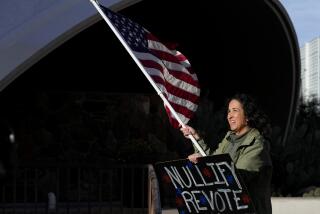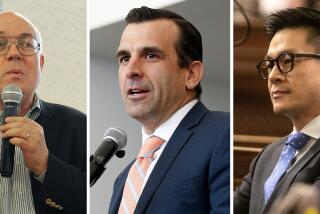Iraq recount finds no fraud
- Share via
Reporting from Baghdad — In an embarrassing rejection of Prime Minister Nouri Maliki’s efforts to overturn his rival’s lead in Iraq’s inconclusive parliamentary election, a laborious manual recount of votes in Baghdad has turned up no evidence of electoral fraud and will not change the final outcome, officials said Friday.
The recount was ordered nearly a month ago after Maliki’s Shiite-dominated electoral slate alleged that as many as 750,000 ballots had been manipulated, with the worst violations occurring in Baghdad.
Had the allegations been upheld, the recount could have eroded the two-seat lead of former Prime Minister Iyad Allawi’s faction. Allawi, a secular Shiite supported by Sunni Arabs, is claiming the right to form the next government as the head of the largest, if not majority, bloc in parliament.
Iraq’s election commission announced that the recount of Baghdad’s 2.5 million votes had found no fraud. Officials familiar with the process said that though there would be some minor adjustments to the final tally, due to be announced Monday, none was attributable to fraud and they were not sufficient to alter the overall result, which gave 91 seats in the 325-member parliament to Allawi’s Iraqiya bloc and 89 to Maliki’s State of Law coalition.
“There is no evidence that there was manipulation, or forgery or any grievous mistake,” commissioner Qassem Aboudi said at a news conference.
Khalid Asadi, an official with Maliki’s coalition, said the prime minister would await the release of the tally before deciding whether to take any further steps to challenge the results.
The recount, conducted by dozens of workers in the cavernous ballroom of a Baghdad hotel, has delayed the final certification of the results of the March 7 election. That is a source of intense frustration for U.S. officials, who hope a new government will be in place by the end of August, when the American military is due to complete its withdrawal of nearly 50,000 combat troops.
U.S. officials say the pullout, which will leave 50,000 troops in Iraq as advisors and trainers until the end of 2011, is on track regardless of whether a new government is formed. “We are on pace to be at 50,000 by Sept. 1, as the president directed,” said military spokesman Maj. Gen. Stephen Lanza.
There are, however, concerns that insurgents are trying to take advantage of the political vacuum to wage attacks aimed at heightening the kind of sectarian tensions that tipped Iraq into civil war during the last period of government formation in 2006.
In a statement posted on its website, the Islamic State of Iraq, an umbrella group of militant organizations that includes Al Qaeda in Iraq, warned that “dark days soaked with blood” lie ahead and threatened a renewed round of attacks, specifically targeting Shiite Muslims and the security forces.
The Sunni Arab-dominated militant group also announced that it had named a new “minister of war” to replace Abu Hamza Muhajir, also known as Abu Ayyub al Masri, the senior Egyptian Al Qaeda operative who was killed in a raid by U.S. and Iraqi forces last month along with overall leader Abu Omar al Baghdadi. Nasser Lideen Allah Abu Suleiman, apparently a pseudonym, will henceforth head the group’s military operations, the statement said.
The U.S. military had hoped the slaying of the two top leaders would blunt the militants’ effectiveness, but a string of attacks Monday that killed more than 100 people suggested the insurgents are still active. In further violence Friday, three suicide bombers in the northern city of Tall Afar attacked a soccer stadium during a match, killing at least 12 people and wounding more than 100. Earlier in the day a bomb exploded outside a Shiite mosque in the southern town of Hillah, wounding at least 20, and a late-night bombing in a Baghdad park killed four civilians.
The delay in issuing final results has in turn deferred serious negotiations on the formation of a new coalition government, with no party willing to make a firm commitment without being sure of the number of seats they would receive. Had Maliki emerged with the largest number of seats, his efforts to remain in power would have been hard to challenge.
Instead, his coalition is locked in talks over who should be the next prime minister with the third largest winner, a Shiite bloc with 70 seats that is staunchly opposed to Maliki’s candidacy and would like to see one of its own members get the job.
Although it appears that Iraqiya’s lead will be confirmed, the alliance between the two Shiite blocs makes it unlikely that Allawi will be able to win enough support in parliament to form a government, leaving wide open the question of who will next lead Iraq.
A final result will also have to await a court decision on whether or not to bar nine winning candidates over allegations of ties to the banned Baath Party of the late Saddam Hussein.
That decision likewise will probably not change the final results, officials say, because even if the candidates are eliminated it is expected that they will be replaced by others from their slates.
Salman is a Times staff writer.
More to Read
Sign up for Essential California
The most important California stories and recommendations in your inbox every morning.
You may occasionally receive promotional content from the Los Angeles Times.













